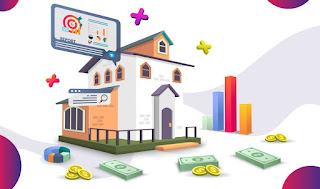The Future of Mortgage Loans: Navigating the Digital Era
Introduction
The world of mortgage loans is undergoing a significant transformation as we step into the digital age. With advancements in technology, changing consumer preferences, and evolving financial landscapes, the future of mortgage loans is shaping up to be a dynamic and innovative one. In this article, we will explore the trends and developments that are likely to define the mortgage industry in the coming years.
1. Digitalization and Streamlined Processes
The future of mortgage loans is undeniably digital. Traditional paper-based processes are gradually becoming obsolete as digital solutions take center stage. Borrowers can now complete applications, submit documents, and even sign contracts online, making the mortgage application process more convenient and efficient.
The use of artificial intelligence (AI) and machine learning algorithms in underwriting is also becoming more prevalent. These technologies enable lenders to analyze vast amounts of data quickly and accurately, allowing for faster loan approval decisions. Borrowers can expect reduced paperwork and faster turnarounds, making the overall experience of obtaining a mortgage smoother.
2. Enhanced Personalization
As lenders harness the power of big data, the future of mortgage loans will see a greater emphasis on personalization. Lenders will use data analytics to assess borrowers' financial profiles and preferences, tailoring loan offers to meet individual needs. This level of personalization can lead to better interest rates, terms, and repayment options for borrowers.
Additionally, AI-powered chatbots and virtual assistants will become commonplace in the mortgage industry. Borrowers will have access to round-the-clock support and can get answers to their questions quickly. These virtual assistants will guide borrowers through the mortgage process, making it more user-friendly and accessible.
3. Alternative Credit Scoring
Traditional credit scoring models heavily rely on credit history, which can be a barrier for individuals with limited or no credit history. In the future, mortgage lenders are likely to embrace alternative credit scoring methods. This includes assessing factors such as rent payment history, utility bill payments, and even social media activity to evaluate a borrower's creditworthiness.
This shift towards alternative credit scoring will open doors for a broader range of borrowers, including millennials and those with non-traditional financial backgrounds. It will also help reduce the emphasis on FICO scores, which have been a predominant factor in mortgage approvals for decades.
4. Blockchain Technology and Smart Contracts
Blockchain technology is poised to revolutionize the way mortgage loans are processed and recorded. By using a decentralized ledger, lenders, borrowers, and other stakeholders can have real-time access to a secure and tamper-proof record of all transactions related to a mortgage.
Smart contracts, which are self-executing agreements with the terms of the loan directly written into code, can automate various aspects of mortgage lending. This includes automatically disbursing funds, updating payment records, and even handling escrow accounts. The use of blockchain and smart contracts will enhance transparency, reduce fraud, and streamline the closing process.
5. Innovative Financing Models
The future of mortgage loans will see the emergence of new and innovative financing models. One such model is shared equity mortgages, where investors or institutions provide a portion of the down payment or ongoing mortgage payments in exchange for a share of the property's appreciation. This can help first-time homebuyers enter the market and share the financial burden.
Furthermore, peer-to-peer lending platforms are likely to expand into the mortgage lending space. Borrowers will have the option to obtain loans from individual investors, potentially offering more competitive terms than traditional lenders.
6. Environmental Considerations
Sustainability and environmental concerns are increasingly shaping the future of mortgage loans. Lenders are beginning to consider a property's energy efficiency and environmental impact when underwriting loans. Homes with green features may qualify for preferential terms or lower interest rates, incentivizing eco-friendly real estate choices.
Additionally, some governments and organizations are exploring the concept of "green mortgages" that provide financial incentives for borrowers who purchase energy-efficient homes or make eco-friendly renovations. As climate change concerns grow, expect these initiatives to gain momentum.
7. Regulatory Changes
Regulatory frameworks are continually evolving, and the mortgage industry is no exception. In the future, we can anticipate regulatory changes aimed at enhancing consumer protection, ensuring fair lending practices, and promoting transparency in the mortgage market.
The use of AI in decision-making processes will also bring about discussions on ethical AI and bias mitigation. Regulations will likely be put in place to ensure that algorithms used for underwriting and credit scoring are fair and do not discriminate against specific demographics.
8. Cybersecurity and Data Protection
With the increasing digitalization of mortgage processes, the importance of cybersecurity and data protection cannot be overstated. Lenders will need to invest heavily in robust cybersecurity measures to protect sensitive borrower information from cyberattacks and data breaches.
In the future, borrowers can expect stringent data privacy regulations, and lenders will be held accountable for safeguarding their personal and financial information. Trust in the security of online mortgage transactions will be paramount.
Conclusion
The future of mortgage loans promises to be a fascinating journey into a highly digital, personalized, and innovative landscape. Borrowers can look forward to streamlined processes, alternative credit scoring, blockchain technology, and a range of financing options. Environmental considerations, regulatory changes, and cybersecurity will also play pivotal roles in shaping the mortgage industry.
As the mortgage industry evolves, both lenders and borrowers will need to adapt to these changes. While the digitalization of the mortgage process offers convenience and efficiency, borrowers must remain vigilant about data security and privacy. With the right balance of innovation and regulation, the future of mortgage loans can provide greater accessibility and affordability for a broader spectrum of homebuyers.


Posting Komentar untuk "The Future of Mortgage Loans: Navigating the Digital Era"